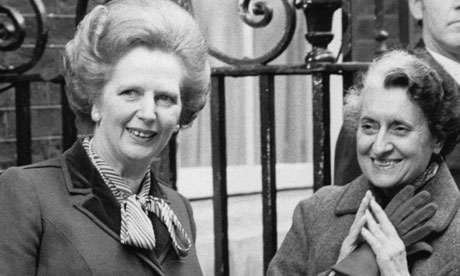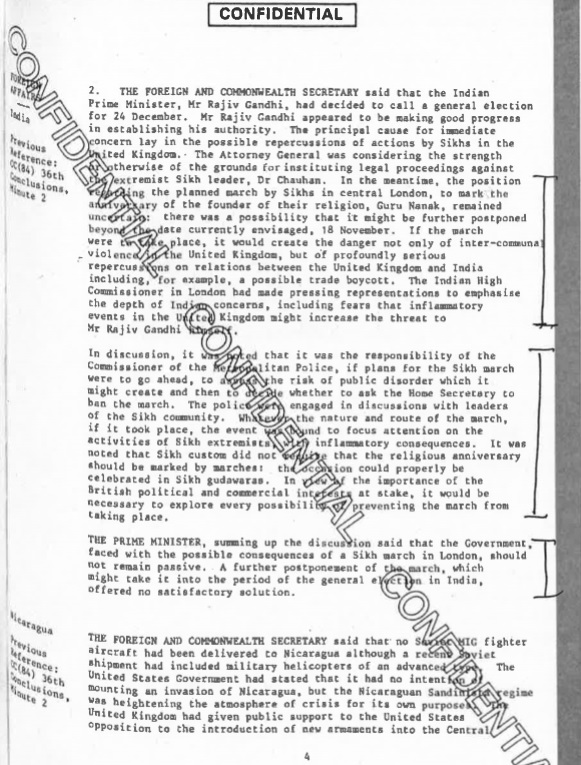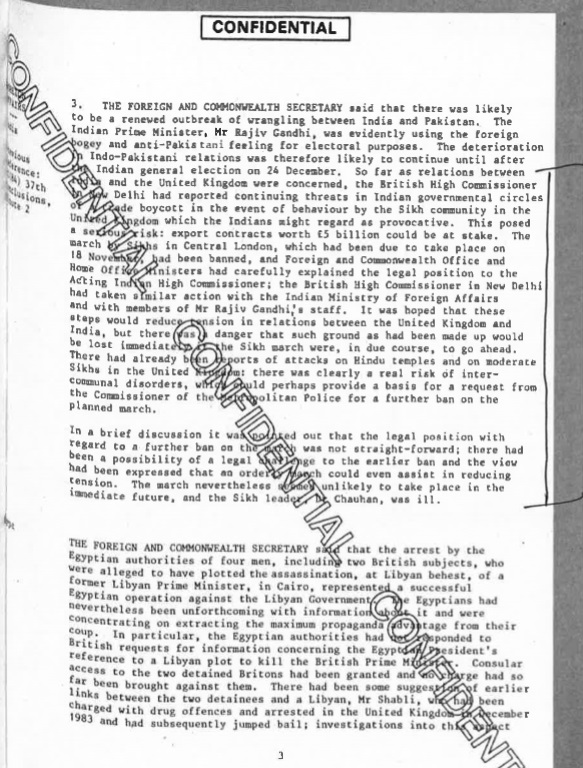Over Seas » Sikh News
Margaret Thatcher’s UK govt. helped India to hide the truth of Sikh Genocide 1984
November 18, 2014 | By Sikh Siyasat Bureau
London, UK: Recent revelations show that the UK Government caved into Indian Government pressure 30 years ago by interfering and preventing Sikhs celebrate the Parkash Gurpurb of the first Sikh Guru, Guru Nanak Dev Ji in November 1984.
Margaret Thatcher, Geoffrey Howe and Leon Britton feared Sikhs may use the occasion to raise voices of protest regarding the truth of the November 1984 Sikh Genocide.
On Sunday 18 November 1984, exactly 30 years ago today, Sikhs wanted to observe the Parkash Gurpurb of first Sikh Guru by holding a Nagar Kirtan, a procession led by the Panj Piare (the five beloved ones) followed by the Guru Granth Sahib Ji, the holy Sikh scriptures. The Nagar Kirtan would have involved the singing of hymns on route in central London and they are held without incident every year in many towns and cities throughout the UK and across the globe where there are a sizeable number of Sikhs.

Margaret Thatcher (L) and Indira Gandhi (R)
However, 30 years ago the Foreign Secretary, Geoffrey Howe stated in a full Cabinet meeting on 15 November 1984 that if the religious procession took place on 18 November ‘it would create the danger not only of inter-communal violence in the United Kingdom, but of profoundly serious repercussions on relations between the United Kingdom and India including, for example, a possible trade boycott.’ There was no possibility of inter-communal violence, the only worry was trade with India.
The Metropolitan Police Commissioner had to assess the risk of public disorder and then to decide whether to ask the Home Secretary, Leon Britton to ban the Nagar Kirtan. The minutes of the Cabinet meeting on 15 November show Geoffrey Howe stated: ‘In view of the importance of the British political and commercial interests at stake, it would be necessary to explore every possibility of preventing the march from taking place.’
Margaret Thatcher, the Prime Minister summed up the discussion by stating: ‘that the Government, faced with the possible consequences of a Sikh march in London, should not remain passive’ and suggested even a postponement of the Nagar Kirtan ‘offered no satisfactory solution’ implying there should be a ban.
The Cabinet meeting minutes of 22 November 1984 shed more light on Indian Government pressure and the failure of the UK Government at the time to stand up to Indian intimidation. Geoffrey Howe stated: ‘the British High Commission in New Delhi had reported continuing threats in Indian governmental circles of a trade boycott in the event of behaviour by the Sikh community in the United Kingdom which the Indians might regard as provocative. This posed a serious risk: export contracts worth £5 billion could be at stake. The march by Sikhs in Central London, which had been due to take place on 18 November, had been banned (by the Home Secretary).’
Bhai Amrik Singh, Chair of the Sikh Federation (UK): ‘What happen exactly 30 years ago today was scandalous. India successfully interfered in the rights of British Sikhs to hold a religious procession worried we may exercise our democratic right to protest about the November 1984 Sikh Genocide. Margaret Thatcher is not alive today to answer questions, but Geoffrey Howe and Lean Britton owe an explanation and apology to the British Sikh community.’
30 years later Sikhs have still not had justice for the November 1984 Sikh Genocide and are holding a serious of awareness raising events to continue to exert pressure on UK politicians to compel the Modi Government to take action.

Cabinet Papers 15 & 22 Nov 84 (1)

Cabinet Papers 15 & 22 Nov 84 (2)
To Get Sikh Siyasat News Alerts via WhatsApp:
(1) Save Our WhatsApp Number 0091-855-606-7689 to your phone contacts; and
(2) Send us Your Name via WhatsApp. Click Here to Send WhatsApp Message Now.
Sikh Siyasat is on Telegram Now. Subscribe to our Telegram Channel
Related Topics: Indira Gandhi, Margaret Thatcher, Sikh Federation UK, Sikhs in United Kingdom




